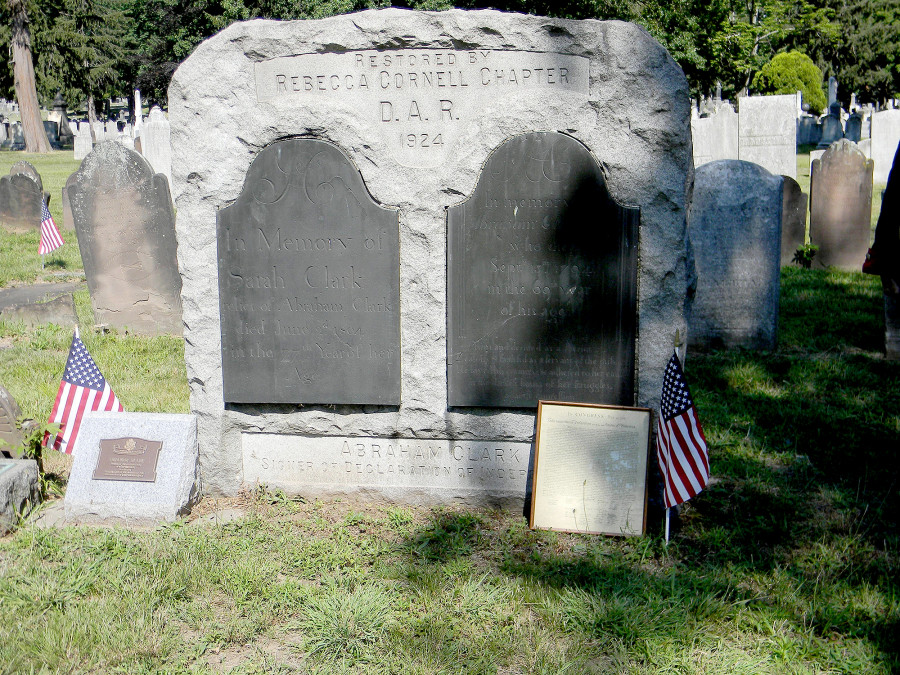
Fourth of July Memorial Ceremony
The Township of Clark is named after Abraham Clark. Clark was the 5th Ward of Rahway until 1863 when the citizens of that area asked to break away and form a new township. The officials in Rahway agreed, and requested they name the new town, Clark.
The Rahway Knights of Columbus Council #1146 Fourth Degree will be holding their annual Fourth of July Memorial Ceremony at 10 a.m., at the gravesiteof Abraham Clark located in Rahway Cemetery. All are invited to attend.
Clark’s SPECIAL CONNECTION TO THE 4TH OF JULY
Submitted by Al Shipley, City historian and Rahway Library research consultant
This story is reprinted from Clark Monthly, June 2012 issue
Americans across the United States celebrate July 4th as the moment in history when our country declared its independence from Great Britain in 1776. We mark the day with parades, picnics, and fireworks and it’s easy to forget the fifty-six brave gentlemen who signed their names on a piece of parchment bearing the title, The Unanimous Declaration of The Thirteen United States of America. For each of the signers, it was a momentous expression in which they committed their lives, their fortunes and their sacred honor to the noble cause of liberty. One of these courageous patriots was Abraham Clark.
Clark was born and raised in Roselle and as a young man worked as a surveyor. This field led him to the study of law, a profession he could employ to settle land disputes and property titles. A good deal of his business was transacted in the larger village of Rahway where he became known as the “Poor Man’s Counselor.” His family also traveled to Rahway on Sundays to worship in the small Presbyterian Church which stood on St. Georges Avenue.
As the fiery talk of separation from Great Britain began, Clark found that he closely identified with the patriotic cause, and by 1774 had become a bold advocate of independence. Aware of the great dangers in which the colonies were placing themselves, he wrote, “We can die but once . . . We are now embarked in a most tempestuous sea . . . It is gone so far that we must now be a free independent state or a conquered country.”
In 1775 his neighbors elected him to the Provincial Congress of New Jersey and in June of the next year he was appointed to the Second Continental Congress which was meeting in Philadelphia.
Clark was well aware of the penalty for treason. Had the British won the war, all signers of the Declaration would have been executed. Fear of this possible fate, however, did not sway him from his obsession to sever relations with the mother country.
During the war years Clark did suffer severe hardships. The Redcoats destroyed all of his property, and two of his soldier sons were captured and held on the notorious prison ship, “The Jersey,” a vile, floating jail where thousands of American prisoners perished. The conditions aboard the ship were horrible and the Clark boys suffered special hardships because of their father’s connection with the rebels. Clark was even promised the release of his sons if he abandoned the American cause, but he refused to betray his country.
Clark was unique in that he was the only member of Congress to serve throughout the entire war. He was re-elected three times and was chosen to represent New Jersey at the Philadelphia Convention in 1787. Due to ill health, however, he was unable to attend this famous convention where our Constitution was being framed.
Clark died at the age of sixty-eight and is buried in the Rahway Cemetery. Residents of Rahway and all of Union County should be proud that of the five signers from the New Jersey Colony, only Clark is buried in this part of the state. Abraham Clark is a name out of the rich pages of Rahway history and a name we should remember as we prepare to celebrate the birthday of our country’s independence.





